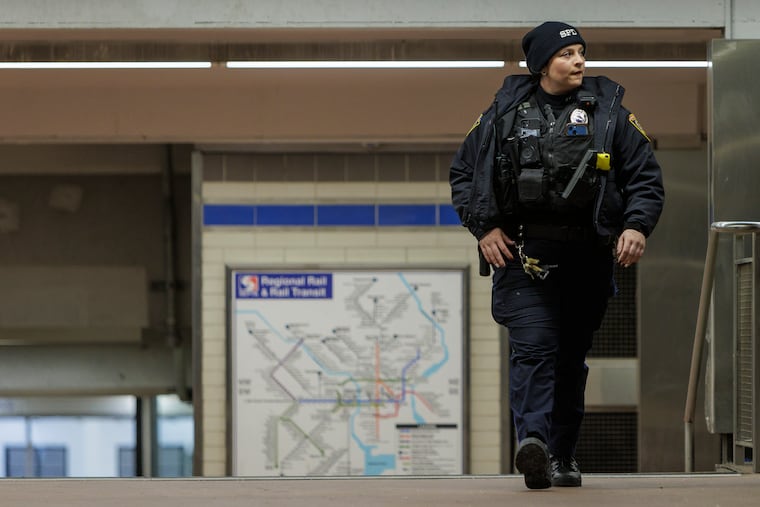SEPTA’s return to treating fare evasion as a criminal offense is good for riders — and its bottom line | Editorial
Despite its imperfections, when it comes to reducing bad behavior on transit, policing works.

Five years ago, SEPTA police stopped treating fare evasion as a crime. It made sense at the time.
SEPTA was doing about as well as a perpetually underfunded and unappreciated transit agency can. More than a million riders a day used its buses, trolleys, and trains, and the agency began to develop ambitious plans to modernize its fleets and extend service. Crime and antisocial behavior like smoking, while not eradicated, were uncommon.
In this positive atmosphere, then-SEPTA Police Chief Tom Nestel announced that some violations would be decriminalized, with fines replacing arrests. The amount of the fines was also reduced, from $300 to $25. Nestel had once been famous for his social media posts of arrested violators, often including the hashtag #cheesesandwich, in reference to a common detention meal. Now he was pivoting to a gentler approach.
» READ MORE: Slow down and help make Philly streets safer | Editorial
The hope was that fines would provide a less painful but still effective deterrent and that by keeping officers out of the courtroom, there would be more time to spend on patrol and improve rider safety further.
Sadly, the reality belied the idealism.
Violations of all kinds increased after decriminalization. Arrests fell by 85% while fines for smoking roughly doubled. Fines for misconduct nearly quadrupled. Fare evasion became so rampant that officials now estimate it represents a quarter of all trips on the city’s Market-Frankford and Broad Street Lines, losing the agency up to nearly $70 million a year.
While SEPTA has piloted evasion-resistant gates, which have been effective at growing revenue at 69th Street Station, the cost of installing them system-wide could be $50 million. Facing these facts, and a growing outcry for more public safety from riders, the agency has decided to criminalize fare evasion once again.
It is a wise response to changing demands.
The move has led to warranted concerns among many of the groups that pushed for decriminalization in the first place, including what happens to fare evaders who may lack resources and now have to contend with the criminal justice system. In some cases, being detained or summoned might cause someone to be late for work or lose a job.
That’s certainly true. But what’s also true is that without serious and significant change in SEPTA’s bottom line, hundreds of thousands of fare-paying riders, many of them poor and working-class, will find themselves struggling to get just about anywhere in the city, let alone to work on time.
As Leslie S. Richards, SEPTA’s CEO and general manager, told WHYY in a recent interview, the agency is hundreds of millions of dollars short of its operating needs. Without additional funding, SEPTA will be forced to consider shutting down services like the Chestnut Hill West, Cynwyd, and Fox Chase lines, as well as the newly restored Girard Avenue trolleys. Bus routes that currently advertise a 15-minute wait could shift to once an hour.
SEPTA is looking for additional state and local support to help bridge this gap, but it also needs fare revenue, including the revenue lost to fare evasion. As the high rates of evasion indicate, the practice has become mainstream, with riders sharing videos of college students and white-collar professionals jumping over or sliding through the turnstiles on social media. If contributing to the public good is not enough of an incentive for doing the right thing, then perhaps the threat of arrest is.
» READ MORE: Challenges remain, but the decline in gun violence is reason to celebrate | Editorial
When SEPTA is forced to enact fare increases this fall, the tens of millions of dollars lost each year to fare evasion will be one of the reasons why. Like the service cuts, these increases will fall heaviest on working-class riders who diligently pay their fares.
In the past, cracking down on fare evaders has also led to a reduction in other forms of misbehavior on the system. So far this year, increased police patrols have helped. SEPTA has reported a 45% reduction in serious crimes on the system, outpacing the city of Philadelphia, which is itself leading the nation in fighting violent crime. Despite its imperfections, when it comes to reducing bad behavior on transit, policing works.
Until advocates can identify alternatives that are just as effective at reducing fare evasion, smoking, and violent crime, transit agencies will have little choice but to go back to the cheese sandwich.